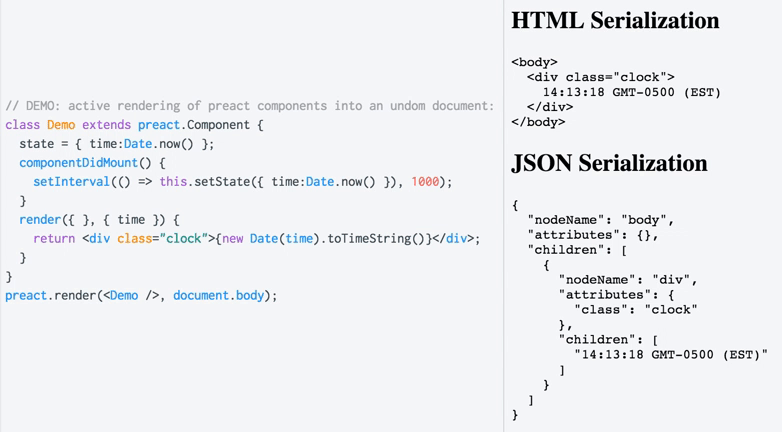@casual-simulation/undom
v3.2.19-alpha.8483944672
Published
Minimal DOM implementation
Downloads
138
Readme
undom
Minimally viable DOM Document implementation
A bare-bones HTML DOM in a box. If you want the DOM but not a parser, this might be for you.
1kB, works in Node and browsers, plugins coming soon!
JSFiddle Demo: Rendering preact components into an undom Document.
Project Goals
Undom aims to find a sweet spot between size/performance and utility. The goal is to provide the simplest possible implementation of a DOM Document, such that libraries relying on the DOM can run in places where there isn't one available.
The intent to keep things as simple as possible means undom lacks some DOM features like HTML parsing & serialization, Web Components, etc. These features can be added through additional libraries.
Looking to 1.0.0
As of version 1.0.0, the DOM constructors and their prototypes will be shared for all instances of a document, as is the case with JSDOM. Once merged, PR #25 will address this by adding an undom.env() function, which returns a fresh document factory with a new set of constructors & prototypes.
Installation
Via npm:
npm install --save undom
Require Hook
In CommonJS environments, simply import undom/register to patch the global object with a singleton Document.
require('undom/register');
// now you have a DOM.
document.createElement('div');Usage
// import the library:
import undom from 'undom';
let document = undom();
let foo = document.createElement('foo');
foo.appendChild(document.createTextNode('Hello, World!'));
document.body.appendChild(foo);Recipe: Serialize to HTML
One task undom doesn't handle for you by default is HTML serialization. A proper implementation of this would be cumbersome to maintain and would rely heavily on getters and setters, which limits browser support. Below is a simple recipe for serializing an undom Element (Document, etc) to HTML.
Small & in ES2015:
Element.prototype.toString = function () {
return serialize(this);
};
function serialize(el) {
return el.nodeType == 3
? enc(el.nodeValue)
: '<' +
this.nodeName.toLowerCase() +
this.attributes.map(attr).join('') +
'>' +
this.childNodes.map(serialize).join('') +
'</' +
this.nodeName.toLowerCase() +
'>';
}
let attr = (a) => ` ${a.name}="${enc(a.value)}"`;
let enc = (s) => s.replace(/[&'"<>]/g, (a) => `&#${a.codePointAt(0)};`);ES3 Version
This also does pretty-printing.
function serialize(el) {
if (el.nodeType === 3) return el.textContent;
var name = String(el.nodeName).toLowerCase(),
str = '<' + name,
c,
i;
for (i = 0; i < el.attributes.length; i++) {
str +=
' ' + el.attributes[i].name + '="' + el.attributes[i].value + '"';
}
str += '>';
for (i = 0; i < el.childNodes.length; i++) {
c = serialize(el.childNodes[i]);
if (c) str += '\n\t' + c.replace(/\n/g, '\n\t');
}
return str + (c ? '\n' : '') + '</' + name + '>';
}
function enc(s) {
return s.replace(/[&'"<>]/g, function (a) {
return `&#${a};`;
});
}

